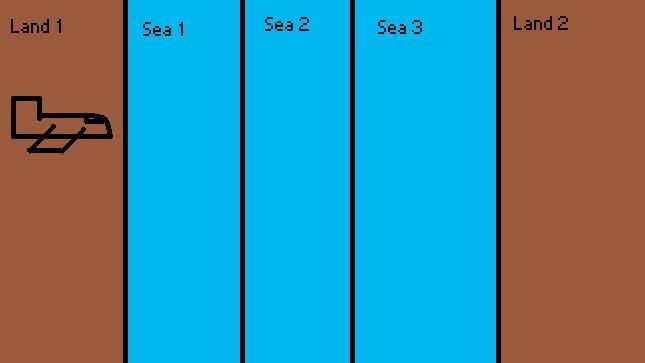Welcome, coolhandluke!
To further clarify, Germany may move out of the sea zone in combat movement even if its ships end up in a friendly sea zone. Moving to avoid combat in this situation is considered a valid combat move.
If I have a plane on land and there is attached sea zone like in the attached picture

Sea1 is attached to land2
eg the Eastern US land is attached to SZ10.
Sea3 is attached to Land2
eg SZ12 is attached to Algeria
Your plane starts in land 1. Can it attack land 2 (assuming it is enemy held) and fly back to land 1 with only 4 movement?
Is moving from Land1 to Sea1, Sea1 to Sea2, Sea2 to Sea3, Sea3 to Land2 are all taking up moves and that is your 4 spaces.
Or
Is moving from Land1 to Sea2, Sea2 to Sea3 (and can then attack Land2) the only moves required in which case after the fight you can move back by Sea3 to Sea2, Sea2 to Sea1 (landing does not take another).
Basically I am asking if a fighter in Eastern USA which needs to cross SZ10, SZ11, SZ12 to hit Algeria do that attack then land safely back in the Eastern USA (assuming we dont have long range fighters).
Do the sea zones attached to land count as a movement space?
Every time a plane crosses a boundary between two spaces, whether they be land territories or sea zones, it uses one movement point. In your picture, it would take the plane four movement points to get from Land 1 to Land 2. Assuming that the plane is a fighter and you don’t have long range aircraft, this would not be a legal move unless both territories were friendly (Noncombat Movement), as the fighter would use its whole movement allowance to get there and have no movement left.
The movement points of an aircraft are TOTAL movement. They must take off AND land within the alloted total movement points.
So in your example, a FIG could non-combat move to land in Land 2, but could not attack it because it takes 4 points to get there, the FIG has to be able to land, and you cannot land in newly captured territory.
Krieghund is 100% correct.